DC Roads Close for Obama
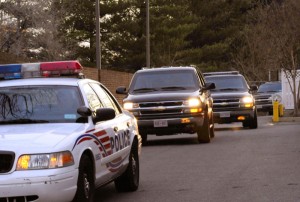
The Secret Service motorcade carrying 7-year-old Sasha Obama departs Sidwell Friends School after dropping off her sister Malia, on the first day of school on January 5, 2009 in Washington, DC. The incoming first family are staying at the luxury Hay-Adams Hotel, with a view of the White House before moving to the president's official guest home, Blair House, on January 15. AFP PHOTO/Karen BLEIER (Photo credit should read KAREN BLEIER/AFP/Getty Images)
One of the side discussions over the Blair House brouhaha has been that having the Obamas stay at the Hay-Adams Hotel would pose a major inconvenience for those who drive through that part of the District of Columbia, as roads around the hotel would be closed for security reasons. With the hotel only three blocks from the offices of the Atlantic Council, I can personally vouch for that much.
Here’s what DC’s NBC station has to say:
Drivers complained of gridlock on I Street, a major east-west thoroughfare through downtown D.C., on Monday, due to street closures in the area. City officials advised advised motorists to stay away from the area for the next 10 days, saying there isn’t much they can do to ease the congestion until the Obamas move out of the hotel.
[…]
The District Department of Transportation (DDOT) has put the following limitations into effect, starting at 1 a.m. on Sunday, January 4 until midnight on January 15:
• 16th Street, NW, between I Street and H Street, will be closed to vehicular traffic and parking will be restricted.
• Connecticut Avenue, NW, between I Street and H Street, will be closed to vehicular traffic and parking will be restricted.
• H Street, NW, between 17th Street and Vermont Avenue, will be closed to vehicular traffic and parking will be restricted.
• Parking will be restricted on I Street, NW, between 14th and 17th Streets.
This is a massive and ridiculous inconvenience to protect against a theoretical threat.
I don’t blame President Bush (or whoever it was that decided to deny the Obamas early entry into Blair House) for this. Nor do I blame President-elect Obama, even though he could have surely started his kids a couple days later in their fancy private school if he cared about us plebes. No, I blame Bill Clinton.
I’m being mostly tongue-in-cheek but it is true that, after decades of the Secret Service begging to shut down the part of Pennsylvania Avenue nearest the White House to traffic, Clinton finally acceded to their wishes in 1995 following the Oklahoma City bombing. While the action was almost universally derided as a ridiculous overreaction, achieving a modest gain in the safety of the First Family in exchange for a massive inconvenience for DC residents, workers, and tourists, the precedent was set.
Now, there’s seemingly no concern at all for the burdens security puts on ordinary folks, so long as the Big Shots are protected. So, when Obama was at home in Chicago running his transition from there, streets were closed around his neighborhood. At the same time, streets were closed around his transition headquarters in southeast DC even though he wasn’t there personally!
- D Street, NW between 5th and 6th is closed to vehicular traffic and parking is restricted.
- Northbound 6th Street St, NW, between Indiana Avenue and E Street, is reduced to one lane of traffic. The other 2 northbound lanes are blocked off.
- Indiana Avenue, NW, between 5th and 6th Streets, has been temporarily converted to accommodate two-way traffic until the traffic restrictions are lifted on D Street.
- No parking is allowed on the west side of 5th Street, NW, between Indiana Avenue and E Street.
- No parking is allowed in the curb lane on the south side of E Street, NW, between 5th and 6th Streets.
- The east side of 6th Street is closed to pedestrian traffic.
Now, they’re closing down the busiest part of working DC to protect his hotel.
And it gets better: In an unprecedented move, they’re shutting the city down entirely for the inauguration.
The U.S. Secret Service and regional transportation officials unveiled a plan yesterday to ban personal vehicles from all Potomac River bridge crossings from Virginia into the District and from interstates 395 and 66 inside the Capital Beltway on Inauguration Day.
The plan would also cordon off a large section of downtown Washington from 4 a.m. to 7 p.m. to help manage the unprecedented crowds expected.
Some bridges and main thoroughfares with access to the city will remain open, including New York Avenue and the Sousa, Whitney Young and Benning Road bridges. But Northern Virginia drivers will be able to reach the District only from the Beltway in Maryland, and officials are urging people not to attempt to drive into the city.
The bottom line, officials said, is to keep the Mall, the Capitol and the parade route clear of traffic. Even people who live in the District or can get in from Maryland or Virginia can’t get anywhere near the inaugural events or the surrounding downtown area by car. Walking, biking and mass transit — which is expected to be jammed — will provide the only access.
I attended the last inauguration (an experience I would not recommend to others) and we managed to drive in from Virginia with only minor inconvenience. Yes, the roads around the parade route were closed. But cars could certainly get in and around the city.
The Inauguration Day closures are less annoying than the ones for the transition office and the Hay-Adams, since it’s just a single day and it’s a major national civic occasion. Besides, federal workers in the National Capital Region get a paid holiday every four years and most offices (including those of the Atlantic Council) follow suit out of practicality. But the daily closures to protect against theoretical dangers to one citizen are outrageous.
It’s long past time to quit treating presidents like kings. Yes, there are people who would do them harm and it’s a major national trauma when one gets killed. So, provide them with bodyguards and armored limousines and take caution when selecting their routes and releasing their schedules. But don’t shut down half a city for their benefit.

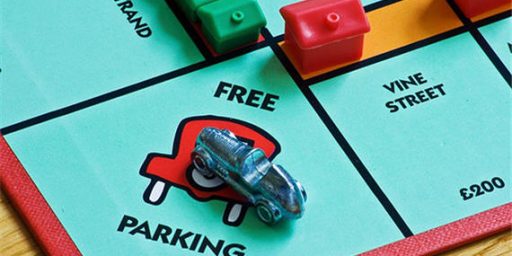
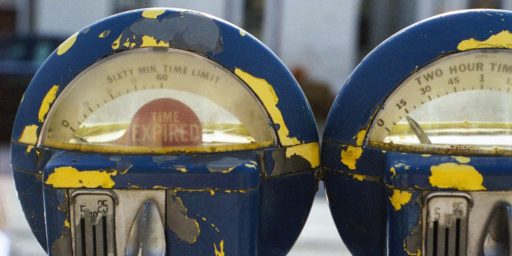

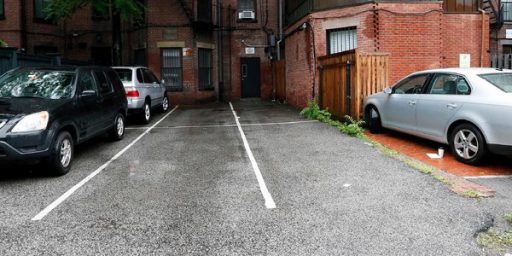
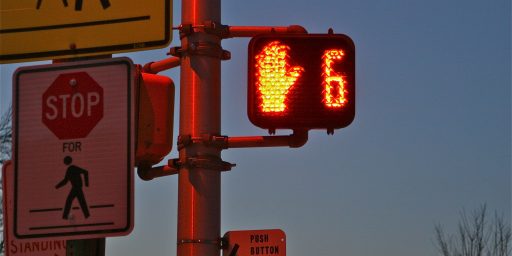
If presidents were only being treated like kings, it would be an enormous improvement. There’s an old proverb/wisecrack that’s illuminating: “a cat may look at a king”. For much of our history any American could gain entrance to the White House to speak with the president just by walking up to the door.
Instead, presidents are being treated like god-kings or fabulous Oriental potentates.
A lot of this is the increased security that happened after the Kennedy assassination, the mass demonstrations of the 1960’s, the multiple assassination attempts of the 1970’s and 1980’s, and the domestic and foreign terrorist attacks of the last 20 years. Some of it is probably the increased professionalism of the president’s protectors.
But some of it is just because the country is so much bigger and the government is so much bigger, richer, and more powerful.
Remember, too, James, that Washington wasn’t supposed to be a city. It was supposed to be a sort of large campus—just the seat of government. This is an issue related to the DC statehood one: if Washington, DC is a city it should be treated like one (which includes representation either in its own right or by devolution); if it just the seat of government it shouldn’t have so many people living there, commuting, etc.
There is a legitimate need for security for the president-elect as well as other high-level government officials, as ‘undemocratic’ as it may seem. The days of just walking up to the White House and knocking on the door are long gone. So, too, is the ability to drive on Pennsylvania Ave, in front of the building at 1600. Maybe it started with the Puerto Rican terrorists shot down in front of the Blair Mansion during the Truman administration.
But security can certainly be a pain in the neck for residents. My wife has a house in Georgetown that was three doors down from then-VP candidate John Edwards, and a block from John Kerry’s house. Secret Service did not make the situation any more pleasant, taking up large numbers of parking places and shutting down the streets abruptly, albeit briefly.
The situation was similar with the security around Madeleine Albright’s place when she was SecState. Neighbors gripe, too, at the fact that some houses have visits from the VP or high-level foreign officials, which lead to street closures and jammed traffic.
The latest buzz is that Oprah is looking for a place in Georgetown, maybe the Evermay mansion, maybe the Edwards’ former house. Not a government official, of course, she will still have security issues that will make life more complicated for those living nearby.
Part of the price of living in DC, I guess.
Amen James.
I just was looking at the complete list of road closures and was wondering what was open. Only the Beltway is my guess, and it is outside DC. I too went to the 2004 inauguration, and am glad I’m not going to this one. Just wait until the masses attempt to reenter the Metro stations (I hope I’m wrong).
Last night on NPR there was talk about the new essay contest to get tickets, comparing it to Willy Wonka and the Chocolate Factory with a Golden Ticket. This is getting silly.
1. I don’t recall any complaints about Cheney’s daily trips at lunch time from his undisclosed location(s) back to the Naval Observatory lo these many years. But then that merely affects Connecticut and Wisconsin Avenues at midday. (Oh, and he’s a Republican god-king by the standards used in this entry and its thread.)
2. Cities in the US and Europe with considerably higher population densities than DC have embraced pedestrianization. (See, e.g., Trafalgar Square, London.) Consider the closure of Penn Ave in front of the White House as a beautification process.
A motorcade isn’t the same as a weeks-long closure of major arteries.
It’s not about residents so much as commuters. Unless one lives in non-Georgetown DC or the very near suburbs, driving is the only option for getting back and forth from work. When I’m in tourist mode, I gladly walk for miles and miles.
It’s rather inefficient, however, to walk 15 miles each way to work in a business suit. And between two income families and frequent job changes, “live closer to the office” isn’t a realistic option for most of us.
In addition to the discomfort factor of long walks to work, there’s the issue of what rents/mortgage you pay in living close to work. In DC, that can be a pretty tidy sum.
DC public transportation doesn’t exactly suck, but it’s far from truly usable by the majority of the people who live and work there. It doesn’t begin to compare, though, to the ‘pedestrianized’ cities of Europe where public transportation is, generally speaking, a major asset.
For $60/mo in many European cities, you can buy a ticket good on buses, undergrounds, and trains. That amount in the US doesn’t get you a month on the underground or even two weeks in commercial parking lots. The difference, of course, is that European transportation is subsidized heavily.
It that a good use for tax dollars? I suspect it is, especially if you get personal benefit from it.
I think having secret service serve as body guards and armored motorcades make sense. I can maybe see shutting down a road or two when the president or president elect is moving from point a to point b. But closing down roads permanently for days or weeks seems like overkill.
They should be able to effectively protect the president when he is at home or in an temporary home or in an office without shutting down a city.
While posted in the UK, it was interesting to see the difference between UK and US security setups for heads of state. The US President travels in a 20-car motorcade, the Queen travels in a single car with a handful of motorcycle outriders.
The US Secret Service prefers to shut down streets an hour or so ahead of a motorcade’s passing; the UK uses those outriders as rolling roadblocks, leapfrogging from intersection to intersection to close them off.
I do recall the Secret Service’s being annoyed that they could not close the M4 between Heathrow and the city for Clinton’s first motorcade. They were also miffed that the Brits wouldn’t close Heathrow for the arrival/departure of Air Force One.
Actually, they weren’t happy with security at #10 Downing St., either, until its subtleties were pointed out to them.
The Secret Service is paranoid, I guess. How many British PMs have they lost to assassins? But they do go overboard. The current POTUS was at a very secure Top Secret SCIF facility in the DC area recently, and I had a chance to see first hand the Secret Service in action. I was a little amused to see the extent to cocoon the POTUS from all those untrustworthy government workers with TS SCI clearances.
DC Loser: Well, given how popular he is at CIA and State, maybe that wasn’t just paranoia!? 🙂
And if you don’t benefit, you get to pay for someone else’s cheap, convenient commute. Not as much of a good deal in that case.